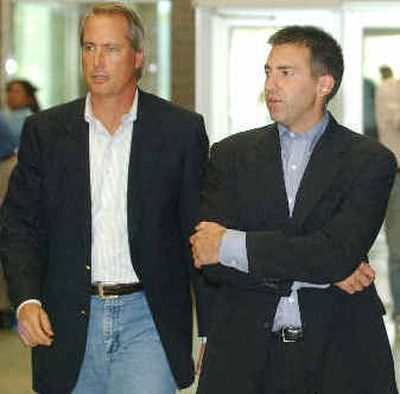Experts: Bryant case example of why rape is underreported

For all its excess – of celebrity, money and media attention – the Kobe Bryant case at its core was fairly typical of rape cases, legal sources said Thursday, and its clouded ending underscored the barriers to successfully prosecuting one of the most widely underreported crimes in the United States.
An evening that began with “mutual flirting,” by the account of Bryant’s accuser, ended with his claim of consensual sex pitted against her contention of a forced assault. Those hallmarks of an acquaintance-rape case were accompanied by one other: a scrutiny of the woman’s sexual history so intense that she ultimately refused to testify.
“This is why women don’t report – they are worried about facing some version of what the alleged victim in this case faced,” said Michelle J. Anderson, a law professor and rape expert at Villanova University in Pennsylvania. “This is the defense strategy in acquaintance rape trials all the time.”
What promised to be the biggest celebrity trial since O.J. Simpson’s double murder case 10 years ago collapsed Wednesday with prosecutors saying Bryant’s accuser refused to testify. At the same time, attorneys for the NBA star released a carefully worded apology saying, in part, “I recognize now that she did not and does not view this incident the same way I did.”
Speculation began almost immediately that the uncommonly tidy conclusion suggested a settlement was at hand in a civil lawsuit the woman brought two weeks before the start of jury selection in the criminal case.
The result, some legal experts said Thursday, was damaging not only to other rape prosecutions, but more broadly, to the criminal justice system.
“It’s true, victims already feel intimidated and discouraged from coming forward,” said Wendy J. Murphy, a professor at the New England School of Law in Boston who teaches courses on sexual violence. But, Murphy said, the outcome in the Bryant case points to a larger issue of lost trust in the court system.
“How dare we have a justice system that would allow a criminal prosecution to be used to jack up the value of a collateral civil case?” she said.
The issue of money was central in the case from its start – Bryant, who this year signed a $136 million contract with the Los Angeles Lakers, bought his wife a $4 million diamond ring when the rape allegations first surfaced. In his statement Thursday, he said he regretted the expensive burden the case put on the small town of Eagle, Colo.
Prosecutor Mark Hurlbert said in a statement that his office had no option but to drop the charges. “The victim has informed us that she does not want to proceed with this trial,” the statement said. “For this reason, and this reason only, the case is being dismissed.”
Still, Murphy noted that prosecutors could have done the same thing government lawyers do every day to bring reluctant witnesses to court: Issue a subpoena.
“It shouldn’t only be about winning, it should also be about truth-finding,” Murphy said. “I know it sounds harsh, but it’s simply not the victim’s job, nor does she have the power to dictate whether a case goes forward.”
Bryant’s accuser, a 19-year-old hotel desk clerk when the alleged assault occurred at the Lodge & Spa at Cordillera the night of June 30, 2003, was at the center of extraordinary scrutiny from the day the allegations became public.
In court records, Bryant’s lawyers variously described the woman as sexually voracious, mentally unstable and addicted to drugs. Her name was not published by mainstream media, but it appeared inadvertently in some court records and became widely available, along with photos, on the Internet. She lost her job and received telephone death threats.
“She just didn’t think that it was going to get this big,” a teenage friend, Brigitte Lowry, told Denver’s Rocky Mountain News last year.
The final blow – and the one with greatest repercussions in other rape prosecutions – was a ruling this summer by presiding District Judge Terry Ruckriegle to allow some evidence about the woman’s sexual activity during a critical 72 hour-period around the time of the incident.
Colorado’s “rape shield law” generally prevents testimony about an alleged victim’s sexual history, but there are exceptions when the evidence could raise doubt about the source of injuries. Defense lawyers cast the evidence as critical to Bryant, 26, who faced the possibility of life in prison if convicted on the single count of felony sexual assault.
“The rape shield law ruling by the judge is really the reason the case tanks,” said Anderson.
Nationally, fewer than 20 percent of rapes are ever reported, Murphy said. Of those cases that do reach prosecutors, about 85 percent involve acquaintance-rape allegations, which often follow the general pattern of the Bryant case, said Karen Steinhauser, a former sex-crimes prosecutor who now is a visiting professor at the University of Denver.
“What happens is this sends a message generally about where the culture is on this issue,” Anderson said. “What this says to the average rape victim is, we, as a society, have not moved beyond a place where we are obsessed with her sexual history.”